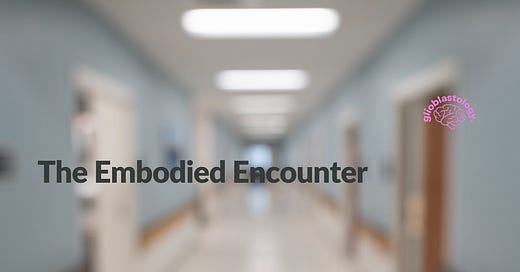We broke the news on Facebook like this:
Friends, we wanted to provide an update following our MRI last week. The short of it is the radiation held a large tumor mass stable but without any shrinking of tumor. A couple of other mass-like spots in a different location but same hemisphere grew in size. These concern us because they indicate spreading disease.
It is too early to know whether the new chemo is having an effect. We’ll realistically need at least four or five weeks to determine any response, and truthfully, at least one more six-week cycle would offer more evidence of potential response. This puts us in a difficult waiting game.
Functionally, as expected, the additional radiation has worsened my motor impairment on the left side. Our plans for now are to stay close to home, enjoy time with family, and wait patiently for more scans and the next round of chemo a few weeks out.
Let me recall an experience: When I was first diagnosed in 2016, while my neuro oncologist described the conditions of my diagnosis, the nurse navigator reached across from her chair to grasp my hand and Whintney’s hand in each of hers. She did not speak. Only held.
The touch conveyed a seriousness that could not be captured in our lay understanding of the technical words our oncologist used.
A couple of weeks ago, when reviewing recent MRI scans, our same neuro oncologist–now a nine-year therapeutic partnership; even friendship, I’d wager, delivered more subpar news, and while we did not have a nurse navigator physically present during the virtual visit, another touch showed up; another embodied moment of care. Our neuro-oncologist caught his breath, becoming slightly choked up, if only for a second, a expression sent and received through ethernet and wifi.
Greeting us during our recent radiation follow up visit, our radiation oncologist leaned in and asked thoughtfully, “Tell me about the conversation you’ve been having with [your neuro oncologist].”
A tried and true tactic for patient alignment, what do you know, and how much will I need to tell you? Usually, this suggests less than ideal medical news. But again, the body posture, the leaning in, the quieter tone, leading with a question not a report, these, too, are felt present episodes of care. When these present moments land, the space of medical encounter becomes the space of witness.
Witness is facilitated when the scene is embodied. Just what do you mean by that, fancy philosopher?
The medical establishment often depersonalizes our humanity. This is sometimes called the “clinical gaze” that confuses sight and observation. Sherlock Holmes famously said, well, the author of Holmes placed in his voice, “You see, but you do not observe.” I suggest that the opposite is at work in the clinical gaze: observation, without seeing. Embodiment just means that you are fully present, in the moment, in your body, in touch with yourself. You are not distinct from the MRI images on the monitor, you are the brain on the images. Voice, breath, touch, tears are not abstract artifacts of conversation, they have their origin in your body; in your experience.
The clinical gaze observes but does not see the person, this is why acts of care grounded in our senses become so powerful because they resist the notion of a mediated reality and instead opens a pathway of human encounter between two people who otherwise do not share the same status and agency in a clinical exam room.
Embodiment is something that happens now.
You cannot imagine being in your own body; you must perform it. You must actively check in with the present moment and what your body presents to you in that moment. A touch, a choked breath, a posture, these are not things but events.
While it is profoundly uncertain what these recent developments mean for treatment and survival, to partner in care with an embodied state reminds me to pay attention to what is directly in front of me, and that’s how I intend to spend my time.
I hope to keep smiling, if that’s how I show up, anyway, but either way, I plan to be authentic, and maybe that’s the best lesson of illness.





Thinking of you Adam. GBM is horrible and the waiting is too. I admire your courage and resilience. Hugs for you and your wife and kids.
Thank you for sharing all of this, Adam. Your eloquence and ability to obseve all of this continually amazes me. I went thru my own cancer journey(colorectal cancer)in the past 3 years and about 5 months into it, I switched from all of my doctor’s to a new hospital, new surgeon, everything. What was missing in the first team was this humanity. I’m just recognizing that now. Throughout my son’s GBM treatment, we were fortunate to have a caring team that cared about him as a person. Sending love and prayers